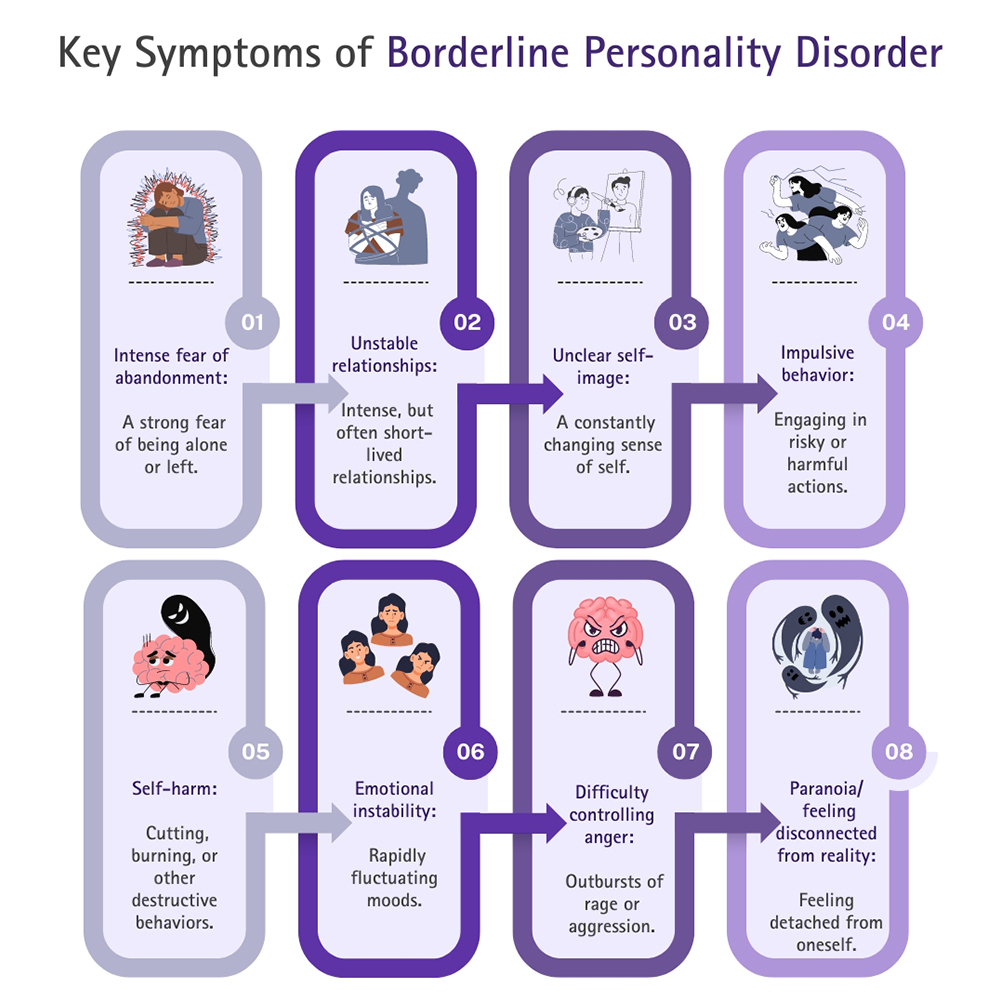Understanding Borderline Personality Disorder (BPD)
What Is Borderline Personality Disorder (BPD)?
Borderline personality disorder (BPD) is a type of personality disorder that typically develops in early adulthood. It is characterized by unstable relationships, seeing oneself differently at times, impulsive behavior, and intense emotions that can rapidly change.
BPD is considered a common diagnosis with 1 in 100 people diagnosed in the U.S. The condition is more prevalent among women, however, this may be due to women being more likely to seek help and therefore receive a diagnosis.
People with BPD may be stigmatized, which may have further negative consequences on their mental health such as depression, anxiety, and substance use disorders.
Some stigmas associated with BPD include being labeled as:
- Manipulative
- Volatile
- Attention seeking
- Having a character flaw
Reducing the effects of stigma starts with connecting with someone who understands. For most people, that may be a therapist. Our practice is proud to serve the Palm Beach area with empathetic and reliable BPD therapy.
Call to schedule an appointment for BPD therapy today!
(561) 363-7994What Are the Signs and Symptoms of Borderline Personality Disorder?
 BPD is a complex condition, which can be distressing to individuals with this condition. People with BPD often experience emotional dysregulation and may struggle with who they are and what they want in life.
BPD is a complex condition, which can be distressing to individuals with this condition. People with BPD often experience emotional dysregulation and may struggle with who they are and what they want in life.
BPD symptoms include:
- Unstable mood
- Unstable and intense interpersonal relationships
- Identity disturbance
- Low self-esteem
- Frantic efforts to avoid real or perceived abandonment
- Self-destructive behavior
- Suicidal ideation, behaviors, or threats
- Chronic feelings of emptiness
- Intense anger
- Paranoid ideation or dissociative symptoms
- Substance abuse
Someone with BPD may experience some, but not all of these symptoms. According to the Diagnostic and Statistical Manual (DSM-5), an individual must experience at least 5 symptoms to receive this diagnosis.
Some signs of BPD include:
- Self-harm
- Anger when an individual feels a fear of abandonment
- Impulsive behaviors
- Extreme mood swings
BPD is a serious mental health condition that can be treated with the help of a licensed clinician who can help you improve your sense of self-worth and overall well-being.
What Causes Borderline Personality Disorder?
Several risk factors for BPD include:
- Genetics: BPD can run in families as there may be a genetic predisposition. However, not all people who have the genes for BPD will develop the condition.
- Environment: Childhood neglect, traumatic experiences, and abuse can lead to BPD.
- Substance use: Substance use can have side effects that look like BPD. It is important to maintain a minimum of 6 months off substances before receiving an accurate diagnosis.
Additionally, according to attachment theory, people with insecure attachment styles such as anxious or disorganized attachment styles have a higher risk of developing BPD. This suggests that a baby’s bond with the mother may affect the development of certain mental health conditions.

How Does BPD Feel?
Imagine you’re navigating a challenge at work and a sudden wave of anxiety comes over you. A casual comment from someone close may awaken your inner critic, which screams “you are not good enough”. You may find yourself leaving relationships or jobs to avoid this intense emotional pain.
BPD symptoms can be overwhelming. It is important to acknowledge that your emotions are valid, although they do not define you. You don’t have to deal with these challenges alone.
At the Trauma Therapy Center, your therapist will support you in exploring coping strategies to navigate intense emotions in a healthy way. You may also learn grounding skills to help you stay present in the moment and create a self-care plan that will equip you to handle future challenges.
Treatment Options
BPD is a multilayered condition, which requires professional intervention to effectively manage symptoms and navigate a path towards healing. Managing BPD alone can be overwhelming, but a licensed counselor can help provide you with practical tools and strategies to improve your interpersonal effectiveness and self-esteem.
Can Therapy Cure BPD?
Therapy cannot cure BPD, however, it is the best course of action to treat the symptoms and improve the quality of your life. BPD is a complex disorder but can be managed with the support of a skilled therapist or clinical social worker.
A support system is a crucial part of BPD recovery. A support system can consist of family, friends, or a support group.
How Is Borderline Personality Disorder Diagnosed?
Diagnosis of BPD requires assessment by a clinical therapist, counselor, or psychologist. Assessment includes discussing your medical history, family history, and symptoms.
Your therapist may refer you to a physician for a medical assessment to rule out any medical conditions. If you think you have BPD it is important to talk to a qualified clinician.
Different Therapeutic Options
The first line of treatment is psychotherapy. Some options for therapeutic interventions include:
- Dialectic Behavioral Therapy (DBT): DBT can help you learn skills to regulate your emotions and tolerate distress.
- Mentalization-based therapy (MBT): MBT can help you understand your own and other people’s thoughts and feelings to improve relationship issues.
- Schema-focused therapy (SFT): SFT helps individuals identify and change their problematic thought patterns.
- Psychodynamic therapy: This type of therapy can help you understand the underlying internal conflicts, emotions, and patterns that may contribute to your symptoms.
- Cognitive behavioral therapy (CBT): CBT is a highly effective therapy that can help you identify and change the negative thoughts that lead to negative feelings and behavior patterns.
Together with your therapist, you can decide the best course of treatment for your specific situation, needs, and preferences.
Call to schedule an appointment for DBT therapy today!
(561) 363-7994DBT in Depth
Dialectical behavioral therapy (DBT) is a type of cognitive behavioral therapy (CBT) specifically designed for BPD with a focus on mindfulness, distress tolerance, emotion regulation, and interpersonal effectiveness.
During this form of therapy, you will have an opportunity to discuss your feelings and receive validation of your experiences. Your therapist’s office is a place where you can feel accepted, heard, and fully supported in your self-improvement journey.
The Role of Medications
Some medications that can treat the symptoms of BPD include:
- Antidepressants
- Mood stabilisers
- Antipsychotics
Although medications alone cannot treat BPD, the best course of treatment is a combination of consistent therapy sessions, medication, and self-care.
What Are the Self-Care Strategies for BPD?
Self-care is important for everyone but can be extremely beneficial for people with BPD. Self-care strategies for BPD include:
- Learning your triggers
- Practicing coping skills
- Eating healthy foods
- Getting enough sleep
- Incorporating physical activity into your daily routine
Remember to be patient with yourself. Recovery is not linear and is a lifelong process. With the help of a therapist at the Trauma Therapy Center, you can manage your emotions, improve your relationships, increase self-esteem, and enhance your overall well-being.
Finding a Therapist in Palm Beach County
Finding the right therapist is a vital part of your recovery. Your therapist needs to be someone you can trust, be honest with, and feel accepted by. The best BPD therapist is knowledgeable in DBT skills, empathetic, and compassionate.
Our therapists in West Palm Beach are dedicated to being your partner in BPD recovery and collaborating on a treatment plan. We believe that therapy is a collaborative process and will work together to find the solutions that are right for you. We also provide treatments for narcissistic personality disorder, somatic symptom disorder, seasonal affective disorder, trauma bonding, and many other types of disorders and trauma types.
Our commitment to effective treatment for borderline personality disorder in WPB is unwavering. We’re here to guide you towards healing and offer the support you deserve. Take the first step towards a brighter future – reach out to us today and let us help you and your loved ones on your journey to managing BPD.

